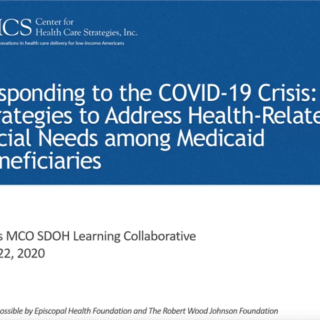This webinar, supported by the Episcopal Health Foundation and the Robert Wood Johnson Foundation, and in partnership with the Texas Health and Human Services Commission, the Texas Association of Health Plans and the Texas Association of Community Health Plans, provided Texas MCOs the opportunity to share and learn from one another about the challenges and opportunities to address members’ social needs during the COVID-19 pandemic. Details of the session are available below.
Agenda
I. Welcome and Introduction
Anna Spencer, Senior Program Officer at the Center for Health Care Strategies, welcomed participants and provided a brief overview of the webinar agenda. Shao-Chee Sim, Vice President for Applied Research at Episcopal Health Foundation, offered opening remarks on the continued desire to support HHSC and the MCOs in their efforts to address the health-related social needs of Medicaid beneficiaries.
- State Updates
Dr. Ryan Van Ramshorst, Chief Medical Director, Medicaid & CHIP Services at the Texas Health and Human Services Commission provided an update on state’s evolving SDOH strategy. Dr. Van Ramshorst shared that HHSC is conducting a study looking at the impact of COVID-19 on vulnerable populations, focusing on race, ethnicity, socioeconomic status and geographic location. The study, which is expected to be released in the fall, will help to identify SDOH priorities in Texas, and provide input on ways HHSC and MCOs can align key activities (see link to Dallas Morning News article below).
IV. Panel Discussion: MCO Plan Perspectives on Addressing Health Related Social Needs during COVID-19
Plan representatives shared their respective perspectives on how COVID-19 has impacted their efforts to address Medicaid members’ health-related social needs, including food insecurity; unemployment; mental health/depression; housing instability; and internet connectivity. Panelists included: Nathan Hoover, Superior Health Plan; Frank Dominguez, El Paso Health; and John Wendling, Parkland Community Health Plan. Below is a brief summary of plan activities to date.
Nathan Hoover, Superior Health Plan:
- Leveraging technology and expanding provider capacity to deliver care through telemedicine;
- Created an online COVID-19 resource page to provide critical information to providers and members, including details on testing;
- Donations to food banks and other community resources to address immediate social needs;
- Working with school districts to provide health care for students, particularly as children continue to be learning in virtual environments;
- Engaging in conversations with staff and providers about health disparities:
- Recognize that COVID-19 is disproportionately affecting communities of color;
- Developing testing sites and guidance to connect members with free testing/follow up care.
Frank Dominiguez, El Paso Health
- Conducted early focus group with members and providers to better understand immediate health and SDOH needs,
- High turnout among members/providers; no incentives for participation offered;
- Have quickly expanded telehealth offerings for both behavioral and physical health visits;
- Offering community-wide food drives, car seat and backpack events:
- Targeting members but food drives are open to the whole community; collaborating with other community providers/health plans to scale effort
- Costs covered by El Paso Health
- Developing online, culturally competent education programs, including prenatal classes;
- Interested in exploring with HHSC QI cost reporting for unique expenditures as part of COVID-19 response efforts.
John Wendling, Parkland Community Health Plan
- Ensuring providers ‘stay whole’ financially during pandemic:
- Have implemented alternative payment models, including capitated payments/shared savings
- Focusing on vulnerable/smaller practices that do not have employed hospital backing or financial resources to operate below practice capacity
- Recognize that health literacy is important and have made significant investments in social media:
- Did a survey of enrollees about media consumption and found that the majority engage through online/social platforms so ramping up education through Twitter/Instagram/YouTube/Facebook
- Anticipating newly eligible Medicaid beneficiaries, and are working with community partners to provide mortgage assistance, WIC/SNAP/unemployment application assistance.
Resources
- Webinar Recording: https://youtu.be/sZlBNWQJGRw
- Communities of Color at Higher Risk for Health and Economic Challenges Due to COVID-19. Kaiser Family Foundation. April, 2020. Available at: https://www.kff.org/coronavirus-covid-19/issue-brief/communities-of-color-at-higher-risk-for-health-and-economic-challenges-due-to-covid-19/
- Health Equity Considerations and Racial and Ethnic Minority Groups. US Centers for Disease Control and Prevention. June 2020. Available at: https://www.cdc.gov/coronavirus/2019-ncov/community/health-equity/race-ethnicity.html?CDC_AA_refVal=https%3A%2F%2Fwww.cdc.gov%2Fcoronavirus%2F2019-ncov%2Fneed-extra-precautions%2Fracial-ethnic-minorities.html
- Texas to begin study of COVID-19 effects on black, Latino populations. Analysis due in fall. Dallas Morning News, June 5, 2020. Available at: https://www.dallasnews.com/news/2020/06/05/texas-to-begin-study-of-covid-19-effects-on-black-latino-populations-analysis-due-in-fall/
